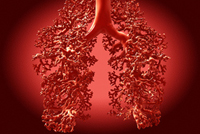Targeted screening can reduce lung cancer mortality

Lung cancer continues to top the cancer death statistics, among other things because many patients are not diagnosed until late-stage. The Medical Director of the Department of Thoracic Surgery calls for clear preventive screening rules.
Lung cancer continues to top the cancer death statistics. Despite all the advances in medicinal treatment, survival rates are not favorable. One major reason for this is that many patients are only diagnosed late-stage. A study from the Benelux countries now shows that targeted radiological screening can reduce male death rates by more than 26 percent, and in women by more than 30 percent.
For the study, people between the ages of 50 and 74 were preventively screened via computed tomography of the chest. The subjects had either smoked more than 10 cigarettes daily for over 30 years, or more than 15 cigarettes daily for over 25 years.
This latest data from Europe confirms research that was carried out several years ago in the USA. Prof. Dr. Bernward Passlick, Medical Director of the Department of Thoracic Surgery at the Medical Center - University of Freiburg and head of the lung cancer center based there, therefore now calls for clear rules to finally be found in Germany to provide patients at risk with suitable preventive screening. "Along with the important prevention through abstaining from nicotine, this may be an appropriate means of significantly reducing cancer mortality," says Professor Passlick. This type of screening could be considered for high-risk patients, such as current or former very heavy smokers.
The current research shows how much computed tomography (CT) screening benefits such individuals: in 50 percent of patients who underwent screening, lung cancer was detected at a stage where the cancer was still quite operable. Here, the chances of recovery are good. In the control group on the other hand, nearly 50 percent of patients were diagnosed with lung cancer at a stage where metastases had already developed and their chances of recovery were significantly worse.
Every year in Germany, around 54,000 people develop lung cancer. Every year, 45,000 people die from this cancer.
Back